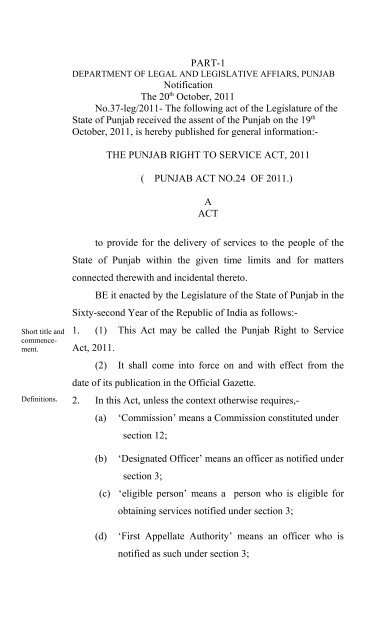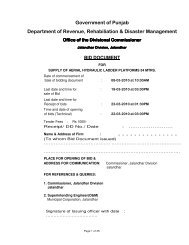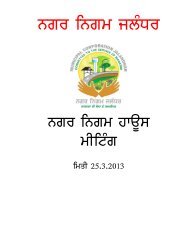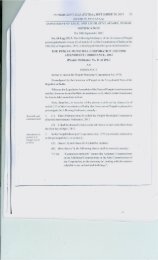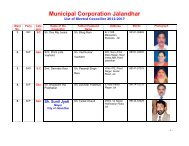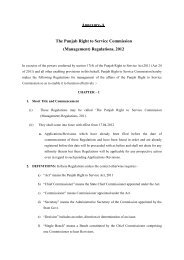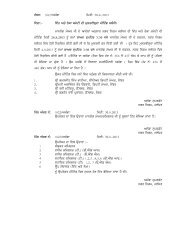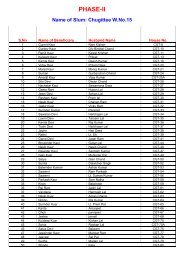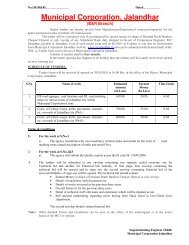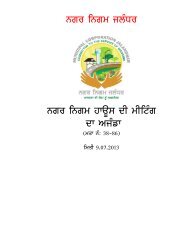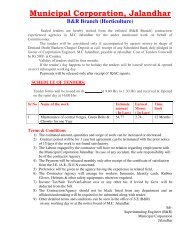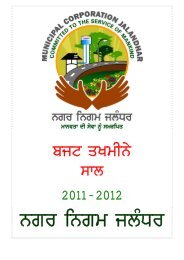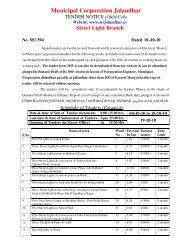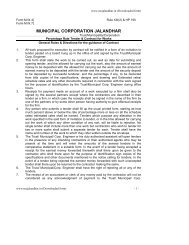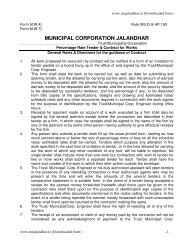Punjab Right to Service Act, 2011 - Right to Service Commission ...
Punjab Right to Service Act, 2011 - Right to Service Commission ...
Punjab Right to Service Act, 2011 - Right to Service Commission ...
Create successful ePaper yourself
Turn your PDF publications into a flip-book with our unique Google optimized e-Paper software.
PART-1<br />
DEPARTMENT OF LEGAL AND LEGISLATIVE AFFIARS, PUNJAB<br />
Notification<br />
The 20 th Oc<strong>to</strong>ber, <strong>2011</strong><br />
No.37-leg/<strong>2011</strong>- The following act of the Legislature of the<br />
State of <strong>Punjab</strong> received the assent of the <strong>Punjab</strong> on the 19 th<br />
Oc<strong>to</strong>ber, <strong>2011</strong>, is hereby published for general information:-<br />
THE PUNJAB RIGHT TO SERVICE ACT, <strong>2011</strong><br />
( PUNJAB ACT NO.24 OF <strong>2011</strong>.)<br />
A<br />
ACT<br />
Short title and<br />
commencement.<br />
Definitions.<br />
<strong>to</strong> provide for the delivery of services <strong>to</strong> the people of the<br />
State of <strong>Punjab</strong> within the given time limits and for matters<br />
connected therewith and incidental there<strong>to</strong>.<br />
BE it enacted by the Legislature of the State of <strong>Punjab</strong> in the<br />
Sixty-second Year of the Republic of India as follows:-<br />
1. (1) This <strong>Act</strong> may be called the <strong>Punjab</strong> <strong>Right</strong> <strong>to</strong> <strong>Service</strong><br />
<strong>Act</strong>, <strong>2011</strong>.<br />
(2) It shall come in<strong>to</strong> force on and with effect from the<br />
date of its publication in the Official Gazette.<br />
2. In this <strong>Act</strong>, unless the context otherwise requires,-<br />
(a) ‘<strong>Commission</strong>’ means a <strong>Commission</strong> constituted under<br />
section 12;<br />
(b) ‘Designated Officer’ means an officer as notified under<br />
section 3;<br />
(c) ‘eligible person’ means a person who is eligible for<br />
obtaining services notified under section 3;<br />
(d)<br />
‘First Appellate Authority’ means an officer who is<br />
notified as such under section 3;
2<br />
(e)<br />
(f)<br />
(g)<br />
‘given time limit’ means maximum time <strong>to</strong> provide<br />
the service by the Designated Officer as notified under<br />
section 3;<br />
‘prescribed’ means prescribed by rules made under this<br />
<strong>Act</strong>;<br />
‘right <strong>to</strong> service’ means a right <strong>to</strong> obtain the service<br />
within the given time limit ;<br />
(h) ‘service’ means any service notified under section 3;<br />
(i) ‘Second Appellate Authority’ means an officer who is<br />
notified as such under section 3;<br />
(j)<br />
(k)<br />
‘section’ means a section of this <strong>Act</strong>; and<br />
‘State Government’ means the Government of the<br />
State of <strong>Punjab</strong>.<br />
Notification of<br />
services,<br />
Designated<br />
Officers, First<br />
Appellate<br />
Authority, Second<br />
Appellate<br />
Authority and the<br />
given time limit.<br />
Providing of<br />
service.<br />
Procedure for<br />
obtaining<br />
service.<br />
3. (1) The State Government may, by notification from time<br />
<strong>to</strong> time, notify the services, <strong>to</strong> which this <strong>Act</strong> shall apply.<br />
(2) The State Government may, by notification, specify<br />
the Designated Officer, First Appellate Authority, Second<br />
Appellate Authority and the given time limit for the purposes of<br />
this <strong>Act</strong>.<br />
4. The Designated Officer shall provide the service <strong>to</strong> the<br />
eligible person within the given time limit.<br />
5. (1) An eligible person shall make an application <strong>to</strong> the<br />
Designated Officer for obtaining any service under the provisions<br />
of this <strong>Act</strong>.<br />
(2) The Designated Officer shall, on receipt of an<br />
application under sub-section (1), provide service or reject the<br />
application within the given time limit and in case of rejection of
3<br />
application, shall record the reasons in writing and intimate the<br />
same <strong>to</strong> the applicant.<br />
(3) Every Designated Officer shall maintain detailed<br />
records of services applied for in a format as may be prescribed.<br />
First appeal.<br />
Second appeal.<br />
6. (1) Any eligible person, whose application for obtaining<br />
service is rejected under sub-section (2) of section 5 or who is not<br />
provided the service within the given time limit, may file an<br />
appeal <strong>to</strong> the First Appellate Authority within thirty days from the<br />
date of rejection or the expiry of the given time limit, as the case<br />
may be.<br />
(2) On receipt of an appeal under sub-section (1), the First<br />
Appellate Authority shall consider the matter and if, in its opinion<br />
the grievance of the eligible person appears <strong>to</strong> be genuine, it may<br />
direct the Designated Officer <strong>to</strong> provide the service within such<br />
period, as may be specified by it and in case of default, <strong>to</strong> appear<br />
before it in person and explain reasons thereof.<br />
(3) After affording an opportunity of hearing <strong>to</strong> the<br />
Designated Officer and the eligible person, the First Appellate<br />
Authority may pass an order either accepting the appeal or<br />
rejecting the same by an order made in writing and in the case of<br />
rejection, the reasons for rejection shall be specified by it in such<br />
order and shall communicate the same <strong>to</strong> the eligible person.<br />
(4) An appeal made under sub-section (1) shall be finally<br />
disposed of by the First Appellate Authority, as far as possible,<br />
within a period of thirty days of its receipt.<br />
7. (1) Any eligible person, whose appeal for obtaining<br />
service is rejected or who is not provided the service within the<br />
time specified by the First Appellate Authority under section 6,<br />
may file an appeal <strong>to</strong> the Second Appellate Authority within thirty
4<br />
Power <strong>to</strong><br />
summon and<br />
inspection.<br />
Penalty.<br />
days from the date of such rejection or the expiry of the time<br />
specified by the First Appellate Authority.<br />
(2) On receipt of an appeal under sub-section (1), the<br />
Second Appellate Authority may pass an order either accepting<br />
the appeal and directing the Designated Officer <strong>to</strong> provide service<br />
<strong>to</strong> the eligible person within such period as may be specified or<br />
reject the same in writing detailing the reasons for such rejection:<br />
Provided that before rejecting the appeal, an opportunity of<br />
hearing <strong>to</strong> the eligible person shall be granted by the Second<br />
Appellant Authority:<br />
Provided further that an order made by the Second<br />
Appellant Authority under this section shall be communicated <strong>to</strong><br />
the eligible person:<br />
Provided further that the appeal made under sub-section (1)<br />
shall be decided by the Second Appellate Authority, as far as<br />
possible, within a period of sixty days from the date of receipt of<br />
appeal.<br />
8. The First Appellate Authority and the Second Appellate<br />
Authority shall, while deciding an appeal under the provisions of<br />
this <strong>Act</strong>, have the same powers as are vested in civil court while<br />
trying a suit under the Code of Civil Procedure, 1908 (5 of 1908)<br />
in respect of the following matters, namely:—<br />
(a) requiring the production and inspection of<br />
documents;<br />
(b) issuing summons for hearing <strong>to</strong> the<br />
Designated Officer and the appellant; and<br />
(c) any other matter which may be prescribed.<br />
9. (1) (a) Where the Second Appellate Authority is of the<br />
opinion that the Designated Officer and/or any<br />
other official involved in the process of providing<br />
such service has/have failed <strong>to</strong> provide service
(b)<br />
5<br />
without sufficient and reasonable cause, it may<br />
impose a lump sum penalty on the Designated<br />
Officer and/or any other official involved in the<br />
process of providing such service, which shall<br />
not be less than rupees five hundred and not more<br />
than rupees five thousand;<br />
Where the Second Appellate Authority is of the<br />
opinion that the Designated Officer and/or any<br />
other official involved in the process of providing<br />
such service has/have caused undue delay in<br />
providing the service, it may impose a penalty at<br />
the rate of rupees two hundred and fifty per day<br />
for such delay on the Designated Officer and/or<br />
any official involved in the process of providing<br />
such service, which shall not be more than rupees<br />
five thousand:<br />
Provided that the Designated Officer and/or any<br />
other official involved in the process of providing<br />
such service shall be given a reasonable opportunity<br />
of being heard before any penalty is imposed on<br />
him/them under sub-clauses (a) and (b).<br />
(2) The Second Appellate Authority may, by an order,<br />
give such amount as compensation <strong>to</strong> the appellant out of the<br />
amount of the penalty imposed under sub-section (1), as may be<br />
specified by it, which shall not exceed the <strong>to</strong>tal amount of the<br />
penalty so imposed.<br />
(3) The Second Appellate Authority may, if it is satisfied<br />
that the Designated Officer and/or any other official involved in<br />
the process of providing such service has/have failed <strong>to</strong> discharge<br />
the duties assigned under this <strong>Act</strong> without sufficient and<br />
reasonable cause, recommend disciplinary action against the<br />
Revision.
6<br />
Display of<br />
services and<br />
the given time<br />
limit.<br />
Constitution of<br />
the<br />
<strong>Commission</strong>.<br />
defaulters under the service rules applicable <strong>to</strong> them in addition <strong>to</strong><br />
the penalty imposed under sub-section (1).<br />
10. Any person may, who is aggrieved by any order of the<br />
Second Appellate Authority, make an application for revision of<br />
the said order <strong>to</strong> the <strong>Commission</strong> or an officer nominated in this<br />
respect under the proviso <strong>to</strong> sub-section (1) of section 12 within a<br />
period of sixty days from the date of such order, which shall be<br />
disposed of in the manner as may be prescribed:<br />
Provided that the <strong>Commission</strong> or the officer nominated, as<br />
the case may be, may entertain the application after the expiry of<br />
the said period of sixty days, if it or he is satisfied that the<br />
application could not be submitted in time for a reasonable cause.<br />
11. The services and the given time limit shall be displayed<br />
locally and on website by the Secretary of the Department<br />
concerned for information of the public.<br />
12. (1) If in the opinion of the State Government, it is<br />
necessary or expedient so <strong>to</strong> do, it may, by notification, constitute<br />
for the purposes of this <strong>Act</strong>, a <strong>Commission</strong> <strong>to</strong> be called the <strong>Punjab</strong><br />
<strong>Right</strong> <strong>to</strong> <strong>Service</strong> <strong>Commission</strong>:<br />
Provided that till such time the <strong>Commission</strong> is not<br />
constituted by the State Government, it may, by notification,<br />
nominate an officer of the State Government, not below the rank<br />
of a Financial <strong>Commission</strong>er <strong>to</strong> perform the functions and<br />
exercise the powers of the <strong>Commission</strong> under this <strong>Act</strong>.<br />
(2) The <strong>Commission</strong> shall be a body corporate, known by<br />
the aforesaid name having perpetual succession and a common<br />
seal with power, subject <strong>to</strong> the provisions of this <strong>Act</strong>, <strong>to</strong> acquire,<br />
hold and dispose of property, both movable and immovable and <strong>to</strong><br />
contract and shall, by the said name, sue or be sued.
7<br />
Composition of<br />
the<br />
<strong>Commission</strong>.<br />
Powers of the<br />
Chief<br />
<strong>Commission</strong>er.<br />
(3) The Head Office of the <strong>Commission</strong> will be at<br />
Chandigarh or at such place, as the State Government may notify<br />
from time <strong>to</strong> time.<br />
13. (1) The <strong>Commission</strong> shall consist of a Chief<br />
<strong>Commission</strong>er and four <strong>Commission</strong>ers and their appointment<br />
shall be made by the State Government in consultation with the<br />
Leader of Opposition in the <strong>Punjab</strong> Vidhan Sabha.<br />
(2) The Chief <strong>Commission</strong>er shall be a retired officer in<br />
the rank and status of the Chief Secretary of the State of <strong>Punjab</strong> or<br />
Secretary <strong>to</strong> the Government of India.<br />
(3) The <strong>Commission</strong>ers shall be retired officers of the<br />
Government of <strong>Punjab</strong> in the rank and status of a Secretary or its<br />
equivalent rank and status in any of the services of the State,<br />
including officers of All India <strong>Service</strong>s from the <strong>Punjab</strong> cadre<br />
and/or expert in the field of Public Administration or e-<br />
Governance with atleast twenty years of experience in teaching or<br />
administration or from amongst other eminent public persons.<br />
14. (1) The Chief <strong>Commission</strong>er shall have powers of general<br />
superintendence and direction in the conduct of the affairs of the<br />
<strong>Commission</strong>. The Chief <strong>Commission</strong>er shall preside over the<br />
meetings of the <strong>Commission</strong> as well as exercise and discharge the<br />
powers and functions of the <strong>Commission</strong> vested in him in<br />
accordance with the regulations framed under sub-section (4) of<br />
section 17.<br />
(2) In case of absence of the Chief <strong>Commission</strong>er or a<br />
vacancy in the office of the Chief <strong>Commission</strong>er, the State<br />
Government may nominate one of the <strong>Commission</strong>ers <strong>to</strong> perform<br />
the functions and exercise the powers vested in the Chief<br />
<strong>Commission</strong>er as long as the vacancy or absence continues.<br />
(3) A <strong>Commission</strong>er nominated <strong>to</strong> discharge the functions<br />
and powers of the Chief <strong>Commission</strong>er under sub-section (2) shall
not be entitled <strong>to</strong> any compensation, allowance or facility in<br />
addition <strong>to</strong> what he would be entitled <strong>to</strong> as a <strong>Commission</strong>er.<br />
8<br />
Term of office<br />
and conditions of<br />
service of Chief<br />
<strong>Commission</strong>er<br />
and<br />
<strong>Commission</strong>ers.<br />
15. (1) The Chief <strong>Commission</strong>er and the <strong>Commission</strong>ers shall<br />
hold office for a term of five years from the date on which they<br />
enter upon the respective offices, or until they attain the age of<br />
sixty five years, whichever is earlier and they will not be entitled<br />
for re-appointment.<br />
(2) If a person already holding an office is appointed as<br />
the Chief <strong>Commission</strong>er or <strong>Commission</strong>er, he shall have <strong>to</strong> resign<br />
or seek retirement from that office before joining the <strong>Commission</strong>.<br />
(3) The Chief <strong>Commission</strong>er or a <strong>Commission</strong>er shall,<br />
before he enters upon his office, make and subscribe <strong>to</strong>, before the<br />
Governor or some other person appointed by him in that behalf, an<br />
oath or affirmation according <strong>to</strong> the form set out for the purpose in<br />
the Schedule.<br />
(4) The Chief <strong>Commission</strong>er or a <strong>Commission</strong>er may, at<br />
any time, by writing under his hand addressed <strong>to</strong> the Governor,<br />
resign from his office. He would also be liable for removal from<br />
the office in the manner provided under section 16.<br />
(5) The salaries and allowances payable <strong>to</strong> and other<br />
terms and conditions of service of the Chief <strong>Commission</strong>er and<br />
the <strong>Commission</strong>ers shall be the same as those of the State Chief<br />
Information <strong>Commission</strong>er and the State Information<br />
<strong>Commission</strong>ers respectively as laid down in sub-section (5) of<br />
section 16 of the <strong>Right</strong> <strong>to</strong> Information <strong>Act</strong>, 2005. All provision of<br />
the aforesaid sub-section shall apply mutatis mutandis <strong>to</strong> the Chief<br />
<strong>Commission</strong>er and the <strong>Commission</strong>ers appointed under this <strong>Act</strong>.<br />
(6) The State Government shall provide the <strong>Commission</strong><br />
with such officers and employees as may be necessary for the<br />
efficient performance of the <strong>Commission</strong> under this <strong>Act</strong>. The
9<br />
Removal and<br />
suspension of<br />
the Chief<br />
<strong>Commission</strong>er<br />
or a<br />
<strong>Commission</strong>er<br />
from office in<br />
certain<br />
circumstances.<br />
salaries, allowances and conditions of service of the officers and<br />
other employees so appointed shall be such as may be prescribed.<br />
16. (1) The State Government may remove the Chief<br />
<strong>Commission</strong>er or any <strong>Commission</strong>er from office after complying<br />
with the provisions of sub-section (2), if he has,-<br />
(i) been adjudged insolvent; or<br />
(ii) been convicted of an offence which, in the<br />
opinion of the State Government, involves moral<br />
turpitude; or<br />
(iii) become physically or mentally incapable; or<br />
(iv) acquired such financial or other interest as is<br />
likely <strong>to</strong> affect prejudicially his functions in any<br />
of the said capacities; or<br />
(v) so abused his position as <strong>to</strong> render his continuance<br />
in office prejudicial <strong>to</strong> public interest.<br />
(2) Notwithstanding anything contained in sub-section (1),<br />
the Chief <strong>Commission</strong>er or any <strong>Commission</strong>er, shall not be<br />
removed from his office, unless,-<br />
(i) a reference is made by the State Government <strong>to</strong><br />
the Chief Justice of the High Court of <strong>Punjab</strong> and<br />
Haryana seeking an enquiry and recommendation<br />
on the proposed removal of the Chief<br />
<strong>Commission</strong>er or the <strong>Commission</strong>er alongwith the<br />
grounds for the removal and material supporting<br />
such proposal;<br />
(ii) the reference is duly enquired in<strong>to</strong> by an inquiry<br />
committee headed by a sitting or retired High<br />
Court Judge or any other person appointed by the<br />
Chief Justice of the High Court of <strong>Punjab</strong> and<br />
Haryana; and<br />
(iii) the inquiry committee makes recommendation that
10<br />
Powers and<br />
functions of<br />
the <strong>Punjab</strong><br />
<strong>Right</strong> <strong>to</strong><br />
<strong>Service</strong><br />
<strong>Commission</strong>.<br />
the Chief <strong>Commission</strong>er or the <strong>Commission</strong>er<br />
ought <strong>to</strong> be removed on such ground or grounds.<br />
(3) The State Government may suspend the Chief<br />
<strong>Commission</strong>er or the <strong>Commission</strong>er in respect of whom a<br />
reference has been made <strong>to</strong> the Chief Justice under sub-section<br />
(2).<br />
17. (1) It shall be the duty of the <strong>Commission</strong> <strong>to</strong> ensure<br />
proper implementation of this <strong>Act</strong> and <strong>to</strong> make suggestions <strong>to</strong> the<br />
State Government for ensuring better delivery of services. For this<br />
purpose the <strong>Commission</strong> may,-<br />
(a) entertain and dispose of revisions under section 10;<br />
(b) take suo mo<strong>to</strong> notice of failure <strong>to</strong> deliver service in<br />
accordance with this <strong>Act</strong> and refer such cases for<br />
decision <strong>to</strong> the First Appellate Authority or the<br />
Second Appellate Authority or pass such order itself<br />
as may be appropriate;<br />
(c) carry out inspections of offices entrusted with the<br />
delivery of services and the offices of the First<br />
Appellate Authority and the Second Appellate<br />
Authority;<br />
(d) recommend Departmental action against any officer<br />
or employee of the State Government who has<br />
failed in due discharge of functions cast upon him<br />
under this <strong>Act</strong>;<br />
(e) recommend changes in procedures for delivery of<br />
services which will make the delivery more<br />
transparent and easier :<br />
Provided that before making such a<br />
recommendation, the <strong>Commission</strong> shall consult the<br />
Administrative Secretary in-charge of the<br />
Department which is <strong>to</strong> deliver the service;
11<br />
(f) recommend additional notifications <strong>to</strong> be notified<br />
under section 3 and may also suggest modifications<br />
in the notifications already issued for better<br />
implementation of this <strong>Act</strong>; and<br />
(g) issue general instructions, not inconsistent with the<br />
provisions of this <strong>Act</strong> for the guidance of<br />
Designated officers, the First Appellate Authorities<br />
and the Second Appellate Authorities.<br />
(2) Where the <strong>Commission</strong> is satisfied that there are<br />
reasonable grounds <strong>to</strong> inquire in<strong>to</strong> a matter arising out of the<br />
provisions of this <strong>Act</strong>, it may, suo mo<strong>to</strong>, initiate an inquiry in<br />
respect thereof.<br />
(3) The <strong>Commission</strong> shall, while inquiring in<strong>to</strong> any matter<br />
under this section, have the same powers as are vested in a Civil<br />
Court while trying a suit under the Code of Civil Procedure, 1908,<br />
in respect of the following matters, namely:-<br />
(a) summoning and enforcing the attendance of<br />
persons, compelling them <strong>to</strong> give oral or written<br />
evidence on oath and producing documents or<br />
things;<br />
(b) requiring the discovery and inspection of<br />
documents;<br />
(c) receiving evidence on affidavits;<br />
(d) requisitioning any public records or copies<br />
thereof from any court or office;<br />
(e) issuing summons for examination of witnesses or<br />
documents; and<br />
(f) any other matter which may be prescribed.<br />
(4) The <strong>Commission</strong> may frame its regulations for the<br />
conduct of its business and any such matter, as the <strong>Commission</strong><br />
may deem fit.
12<br />
<strong>Act</strong>ion by the<br />
Government on<br />
recommendations<br />
of the<br />
<strong>Commission</strong>.<br />
18. (1) The State Government shall consider the<br />
recommendations made by the <strong>Commission</strong> under clauses (d), (e)<br />
and (f) of sub-section (1) of section 17 and send information <strong>to</strong><br />
the <strong>Commission</strong> of action taken within thirty days or such longer<br />
time as may be decided in consultation with the <strong>Commission</strong>. In<br />
case the Government decides not <strong>to</strong> implement any of the<br />
recommendations of the <strong>Commission</strong>, it will communicate the<br />
reasons for not acting on the recommendations <strong>to</strong> the<br />
<strong>Commission</strong>.<br />
(2) The <strong>Commission</strong> shall prepare an annual report of the<br />
recommendations made by it under section 17 along with the<br />
action taken and reasons for not taking action, if any. The State<br />
Government shall cause a copy of this report <strong>to</strong> be laid on the<br />
table of the <strong>Punjab</strong> Legislative Assembly.<br />
Protection of<br />
action taken in<br />
good faith.<br />
19. (1) No suit, prosecution or other legal proceeding shall lie<br />
against any person for anything which is done in good faith or<br />
intended <strong>to</strong> be done in pursuance of this <strong>Act</strong> or any rule or any<br />
regulation made thereunder.<br />
(2) No act done or proceedings taken under this <strong>Act</strong> by the<br />
<strong>Commission</strong> shall be invalid merely on the ground of existence of<br />
any vacancy or by reason of defect or irregularity in its<br />
constitution or absence of any <strong>Commission</strong>er in its meeting.<br />
Bar of<br />
jurisdiction<br />
of courts.<br />
Powers <strong>to</strong> make<br />
rules.<br />
20. No civil court shall have jurisdiction <strong>to</strong> entertain any suit or<br />
proceedings in respect of any matter the cognizance of which can<br />
be taken and disposed of by any authority empowered by this <strong>Act</strong><br />
or the rules or regulations made thereunder.<br />
21. (1) The State Government may, by notification, in the<br />
Official Gazette, make rules <strong>to</strong> carry out the purposes of this <strong>Act</strong>.
13<br />
Power <strong>to</strong><br />
remove<br />
difficulties.<br />
(2) In particular, and without prejudice <strong>to</strong> the generality of<br />
the foregoing power, such rules may provide for all or any of the<br />
following matters, namely:-<br />
(a) the format <strong>to</strong> maintain the records of services<br />
under sub-section (3) of section 5;<br />
(b) the procedure for disposing of an application<br />
made under section 10;<br />
(c) salaries, allowances and conditions of service of<br />
the officers and other employees of the<br />
<strong>Commission</strong> under sub-section (6) of section 15;<br />
and<br />
(d) any other matter which is required <strong>to</strong> be, or may<br />
be prescribed.<br />
(3) Every rule made by the State Government under this<br />
<strong>Act</strong>, shall be laid, as soon as may be after it is made, before the<br />
House of the State Legislature, while it is in session, for a <strong>to</strong>tal<br />
period of ten days, which may be comprised in one session or in<br />
two or more successive sessions, and if, before the expiry of the<br />
session immediately following the session or the successive<br />
sessions aforesaid, the House agrees in making any modification<br />
in the rule, or the House agrees that the rule should not be made,<br />
the rule shall thereafter have effect only in such modified form or<br />
be of no effect, as the case may be, however, any such<br />
modification or annulment shall be without prejudice <strong>to</strong> the<br />
validity of anything previously done under that rule.<br />
22. If any difficulty arises in giving effect <strong>to</strong> the provisions of<br />
this <strong>Act</strong>, the State Government may, by order, not inconsistent<br />
with the provisions of this <strong>Act</strong>, remove the same:<br />
Provided that no such order shall be made after the expiry of<br />
a period of two years from the commencement of this <strong>Act</strong>.
14<br />
Repeal and<br />
saving.<br />
23. (1) The <strong>Punjab</strong> <strong>Right</strong> <strong>to</strong> <strong>Service</strong> Ordinance, <strong>2011</strong> (<strong>Punjab</strong><br />
Ordinance No. 7 of <strong>2011</strong>), is hereby repealed.<br />
(2) Notwithstanding such repeal, anything done or any<br />
action taken under the Ordinance, referred <strong>to</strong> in sub-section (1),<br />
shall be deemed <strong>to</strong> have been done or taken under this <strong>Act</strong>.<br />
THE SCHEDULE<br />
[See Section 15(3)]<br />
FORM OF OATH OR AFFIRMATION TO BE MADE BY THE<br />
CHIEF COMMISSIONER/COMMISSIONER<br />
“I, ___________________ having been appointed Chief<br />
<strong>Commission</strong>er/<strong>Commission</strong>er swear in the name of God that I will<br />
solemnly affirm<br />
bear true faith and allegiance <strong>to</strong> the Constitution of India as by law<br />
established, that I will uphold the sovereignty and integrity of<br />
India, that I will duly and faithfully and <strong>to</strong> the best of my ability,<br />
knowledge and judgment perform the duties of my office without<br />
fear or favour, affection or ill-will and that I will uphold the<br />
Constitution of India and the laws made thereunder.”.<br />
GOBINDER SINGH<br />
Secretary <strong>to</strong> Government of <strong>Punjab</strong><br />
Department of Legal and Legislative Affairs


